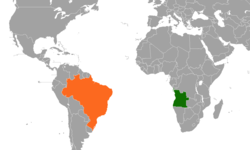Angola–Brazil relations
This article needs additional citations for verification. (August 2009) |
 | |
Angola |
Brazil |
|---|---|
Angola–Brazil relations refers to the historical and current bilateral relationship between Angola and Brazil.
Brazil was the first country to recognize the independence of Angola, in November 1975.[1] Commercial and economic ties dominate the relations of each country. Both countries are former colonies under the Portuguese Empire; Brazil from the early 16th century until its independence in 1822, and Angola until its independence in 1975.
Economic and trade relations
Due to their status as former Portuguese colonies and the transatlantic slave trade, Brazil and Angola have a long and important history of economic ties.
Period of the transatlantic slave trade In 1646, Jesuit friar Gonçalo João[2] succinctly stated the importance of the economic relationship between Brazil and Angola as "Without Angola, there is no Brazil".[3] Angola was a major source of slaves to Brazil, which was, out of the several European colonies in the Americas, the largest single importer of slaves during the Transatlantic Slave Trade. Two-thirds of those slaves in Brazil originated from the Angola-Congo region.[2] Rio de Janeiro depended on the consistent influx of slaves from Angola to work on sugar cane plantations and for re-exportation to Buenos Aires in exchange for silver. Exports from Brazil to Angola in exchange for these slaves included manioc root meal and cachaça.[3] During Dutch occupation of Angola in early 17th century, Brazil and Portugal acted as "co-colonizers" together in their efforts to reclaim the territory. Brazilian historian Luiz Felipe de Alencastro suggests that this critical historical period cemented Brazil's connection to Angola for the duration of the slave trade, and that the construction of Brazil occurred vis-à-vis the destruction of Angola's indigenous kingdoms.[2]
After the fleet of Salvador Correia de Sá e Benevides of Rio de Janeiro successfully expelled the Dutch from Angola in 1648, Angola was essentially under Brazilian rule, thereby "ensuring the continuity of slavery in Brazil for more than two centuries".[3] De Sá similarly understood Brazil's economic dependence on Angola and its consequential importance to Portugal, and is quoted as saying that "without that stronghold[i.e., Angola] Brazil cannot survive, nor can Portugal survive without Brazil".[2]
Contemporary economic relations Trade relations between Angola and Brazil started to grow in 2000. Angola’s exports to Brazil—primarily crude oil—were worth USD460 million in 2006.[4]
Demographic and historical ties
Economic relations between Angola and Portugal had never been as strong as that of Brazil and Angola, and Portuguese influence was minimal in the early 19th century, having been usurped by Brazilian control of the slave trade. The children of Angolan elite were often sent to be educated in Rio de Janeiro as opposed to Lisbon. After Brazilian independence in 1822, there was a desire among some communities in Luanda and Benguela to also declare independence from Portugal and form a confederacy with Brazil. These plans ultimately failed due to diplomatic pressure from Great Britain who did not want to see the creation of a new south Atlantic empire, and stronger political lobbying on part of Angolans who were aligned with Lisbon. In addition, one of the stipulations of Brazil's independence from Portugal was a clause that Brazil would promise not to accept direct control over any Luso-African territories.[2]
When Angola gained its independence from Portugal in 1975, many of the Portuguese settlers and both black and mestizo residents of the former colony emigrated to Brazil and Portugal.
Cultural ties
As former Portuguese colonies, Angola and Brazil share many cultural ties, including language (Portuguese is the official language of each country) and religion (a majority of both countries are Roman Catholics). Both countries are members of CPLP, an association of Portuguese-speaking countries.
Literature Pepetela's A gloriosa família (The glorious family, 1996) takes place during the Dutch-Iberian conflict over the Brazil-Angolan slave trade in the 1600s. It illustrates the geopolitical conflicts of the time through the story of the Van Dunem family, made up of a Flemish patriarch, his African wife, and their mulatto children. The novel offers a critique of the oppression of the patriarchal slave-holding system that formed the foundation for the Angolan nation state.[2]
José Eduardo Agualusa's Nação criousla (1997) takes place during the latter half of the 19th century when the abolitionist debate was taking place across the Atlantic. The novel focuses on the role of Luanda's Creole elites and Portuguese, and Brazilian merchants in the then-illegal transatlantic slave trade.[2]
Music and dance A "cross-fertilization" of musical cultures and dances occurred in the Atlantic triangle beginning in the 17th and 18th centuries via cultural exchange.[3] As a result of this exchange, both countries share a rich history of mixed Afro-Iberian musical traditions, such as the prevalence of the guitar, or viola. An example of early dance exchange is the umbigada, or belly blow, a "basic feature of many dances imported to Brazil and Portugal from the Congo-Angola region".[3]
References
- ^ "Middle Powers: IBSA and the New South-South Cooperation". NACLA. Retrieved 2015-10-20.
- ^ a b c d e f g Arenas, Fernando (2011). Lusophone Africa: Beyond Independence. Minneapolis, MN: University of Minnesota Press. ISBN 978-0-8166-6983-7.
- ^ a b c d e Budasz, Rogério (February 2007). "Black guitar-players and early African-Iberian music in Portugal and Brazil". Early Music. 35 (1): 3–21. doi:10.1093/em/cal117.
- ^ [1] [dead link]

